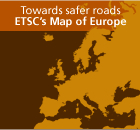Cyprus Presidency of the EU: High Time to Address Serious Injuries on Our Roads
Press release - 02 July 2012Cyprus Presidency of the EU: High Time to Address Serious Injuries on Our Roads 2nd July 2012, Brussels – “With Cyprus assuming the rotating Presidency of the Council of the EU, we have high hopes that road safety will be a priority policy-area for the Union,†said Antonio Avenoso, ETSC Executive Director . “We cannot afford not to focus on improving safety on EU roads. Both Member States and the EU Institutions must step up their efforts in pursuit of the 2020 EU road safety target,†he said. The number of road deaths recorded in the EU in 2011 was 30,100, a reduction of just 3% compared with the previous year. “We hope the Cyprus Presidency will successfully work to support the European Commission towards adopting an EU Strategy to reduce serious injuries occurring on EU roads. There is considerable work ahead in adopting a common EU definition of serious injuries, as well as a set of measures which would lead to a significant reduction in their number,†said Mr. Avenoso. Road deaths represent only the ‘tip of the iceberg’ out of the total number of road collisions: over 324,000 people were recorded by the Police as seriously injured in 2011 . “We strongly believe that a new EU injury strategy should include challenging targets that Member States together with the Commission should work towards. We recommend that each country attempts to reduce the number of serious injuries at the same pace as the number of road deaths. In parallel, Member States should improve the way they record serious injuries by making use of both police and hospital records,†he added. “ETSC congratulates the Cyprus Presidency for choosing to focus on the risks faced by young people on EU roads. The 15-30 age group is facing significantly higher road risks than the rest of the population and they are unfortunately over-represented in the number of road deaths,†said Mr. Avenoso. “We are happy to note that Cyprus is already taking the lead in informing foreign drivers and tourists of the existing traffic rules. We hope that other Member States would heed the Cyprus leadership in this area when implementing the EU Cross-Border Enforcement Directive,†Mr. Avenoso added. The Directive will allow Member States to identify and prosecute foreign drivers who commit certain traffic offences outside the country their vehicle is registered in. Before the November 2013 implementation deadline, EU Member States, together with the European Commission, must put in place mechanisms to inform non-resident road users of the prevailing traffic rules. ETSC also calls on the new Presidency to work towards ensuring that EU funding is awarded to road infrastructure projects only if they are in compliance with the Infrastructure Safety Directive and the Tunnel Safety Directive. “We need to make our roads safer and one of the best ways of ensuring this is through conditionality mechanisms. The application of the two Directives should go beyond the TEN-T network. We call on the Presidency to integrate this theme into the debate on the 2014-2020 Multiannual Financial Framework, particularly as EU Regional Funds are used for building road infrastructure,†concluded Mr. Avenoso. Background Cyprus still has a way to go to improve its road safety record in comparison to other EU countries. It has 71 deaths per million inhabitants, while the EU average is 60. Progress in reducing road deaths has been lower in Cyprus than in the rest of the EU since 2001. Road deaths decreased by only 28% compared to 45% in the EU. Moreover, Cyprus saw an increase of 18% in road deaths in 2011 compared to 2010 (EU average reduction -3%).









